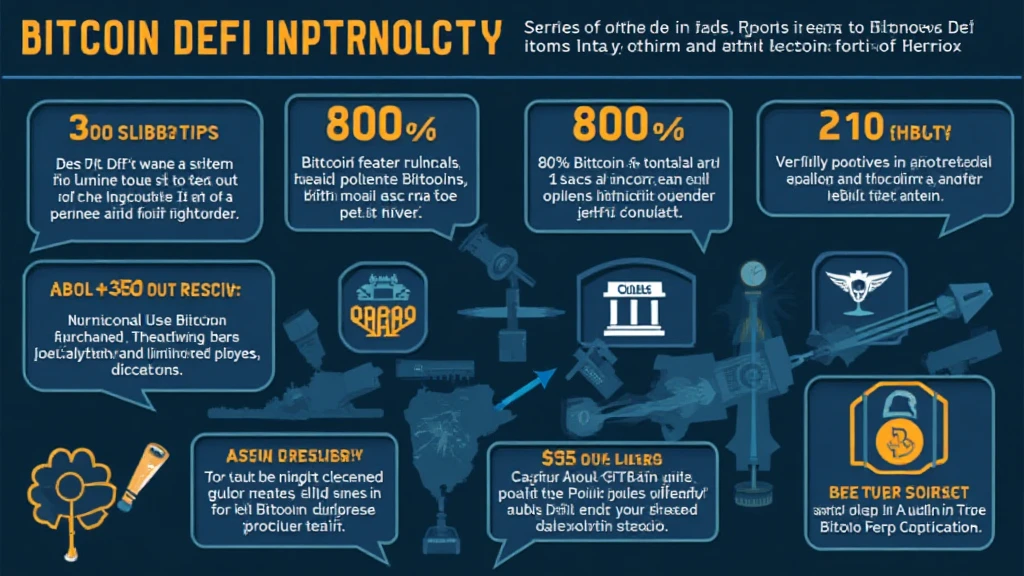
Bitcoin DeFi Protocol Audits: Ensuring Security in a Growing Ecosystem
In recent years, Decentralized Finance (DeFi) has taken the crypto world by storm, offering users unprecedented ways to lend, borrow, and trade without traditional intermediaries. However, the rise of DeFi protocols has also led to vulnerabilities, with over $4.1 billion lost to DeFi hacks in 2024. Hence, auditing Bitcoin DeFi protocols has become essential for ensuring security and trust in this thriving market.
Why Are Bitcoin DeFi Protocol Audits Important?
As the DeFi landscape evolves, the necessity for security audits cannot be overstated. These audits serve to identify potential vulnerabilities before malicious actors exploit them. Consider audits as a safety check, much like inspecting a bank vault where your digital assets are stored. They ensure that your investments are secured against threats, thus building trust within the community.
Understanding DeFi and Its Risks
Decentralized Finance, or DeFi, leverages blockchain technology to recreate traditional financial services without intermediaries. Unfortunately, this decentralization also allows for various risks:

- Code Vulnerabilities: Smart contracts are prone to bugs that can lead to financial losses.
- Market Manipulation: Due to the lack of regulation, manipulation can severely impact price stability.
- Lack of Transparency: Users often lack insights into protocol operations, increasing risks.
The Audit Process Explained
The audit process for Bitcoin DeFi protocols involves multiple phases to ensure comprehensive examination:
- Pre-audit Scoping: Identify the scope of the audit based on the project’s goals and unique challenges.
- Code Review: Conduct hands-on analysis of the smart contracts to find vulnerabilities.
- Testing: Simulate different attack vectors to gauge the smart contracts’ resilience.
- Reporting: Offer detailed insights on vulnerabilities and recommendations for mitigation.
How to Audit Smart Contracts
The process to audit smart contracts isn’t straightforward, but here’s how it can typically break down:
1. Identify key stakeholders in the project.
2. Review smart contract documentation for comprehension.
3. Use automated testing tools to uncover surface-level issues.
4. Conduct manual inspections for deeper vulnerabilities.Common Vulnerabilities Found in DeFi Protocols
During audits, several recurring vulnerabilities are often detected:
- Reentrancy Attacks: Attackers exploit a function call, leading to unauthorized transactions.
- Arithmetic Issues: Miscalculations can create substantial financial glitches.
- Gas Limit and Loops: Inefficient coding can lead to excessive gas costs for transactions.
Case Studies: Lessons from Past Breaches
Analyzing past breaches helps in benchmarking suggestive audits. For instance:
- The DAO Hack (2016): Exploited reentrancy in Ethereum’s most popular smart contract.
- Compound Finance (2021): Incorrect pricing oracles leading to financial discrepancies.
- PancakeBunny (2021): Manipulated governance token leading to massive losses.
Best Practices for Auditing Bitcoin DeFi Protocols
When undertaking audits, implement these best practices to maximize effectiveness:
- Engage with Reputable Auditors: Ensure your auditors have a solid track record.
- Conduct Regular Audits: Repeat audits help maintain ongoing security as protocols evolve.
- Community Involvement: Allow community members to report bugs or issues for peer-driven security.
Future Trends in Bitcoin DeFi Protocol Audits
As DeFi matures, several trends are likely to influence auditing practices:
- Regulatory Scrutiny: Expect increased regulatory frameworks that will require compliance checks.
- Use of AI in Auditing: Artificial intelligence can help detect anomalies in smart contracts much faster.
- Focus on User-centric Security: Developing protocols that prioritize user security will become a norm.
Key Takeaways
Auditing Bitcoin DeFi protocols is paramount for ensuring the security of your assets in an increasingly complex landscape. Ensuring adherence to rigorous audit procedures can safeguard users from a myriad of potential threats.
According to recent statistics, the Vietnamese crypto market has seen a user growth rate of over 50% in 2023, highlighting the need for enhanced security measures like audits to protect rising investments in DeFi.
Incorporating tiêu chuẩn an ninh blockchain through consistent audits and employing the help of experienced professionals can significantly mitigate risks. As we move forward, remaining informed and proactive about these audits will help secure the future of Bitcoin and other DeFi protocols.
Conclusion
To better protect your investments and ensure the longevity of your protocols, it’s essential to prioritize regular audits. Engaging qualified and experienced auditors not only enhances security but also builds trust within the community.
Remember, investing in audits is investing in your future. We observed that failure to prioritize proper audits has led to irreversible losses. Take action now and secure your crypto assets today!
Explore more about audits and create a safer environment for your investments at btcmajor.
About the Author
John Doe is a blockchain security specialist with over 15 published works in reputable journals. With expertise in auditing high-profile decentralized finance projects, he has contributed significantly to enhancing auditing protocols in the industry.






